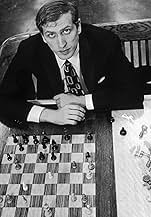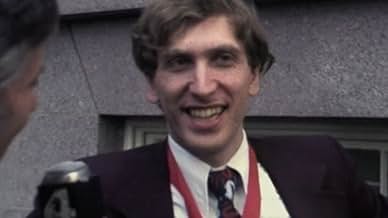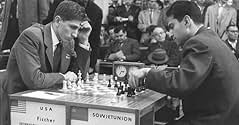Aggiungi una trama nella tua lingua'Bobby Fischer Against the World' is a documentary feature exploring the tragic and bizarre life of the late chess master Bobby Fischer. The drama of Bobby Fischer's career was undeniable, f... Leggi tutto'Bobby Fischer Against the World' is a documentary feature exploring the tragic and bizarre life of the late chess master Bobby Fischer. The drama of Bobby Fischer's career was undeniable, from his troubled childhood, to his rock star status as World Champion and Cold War icon, t... Leggi tutto'Bobby Fischer Against the World' is a documentary feature exploring the tragic and bizarre life of the late chess master Bobby Fischer. The drama of Bobby Fischer's career was undeniable, from his troubled childhood, to his rock star status as World Champion and Cold War icon, to his life as a fugitive on the run. This film explores one of the most infamous and myste... Leggi tutto
- Candidato a 1 Primetime Emmy
- 1 vittoria e 5 candidature totali
- Self
- (filmato d'archivio)
- Self
- (as Dr. Anthony Saidy)
- Self
- (filmato d'archivio)
- Self
- (filmato d'archivio)
- Self
- (filmato d'archivio)
- Self
- (as Fernand Gobet PhD)
Recensioni in evidenza
Some say Fischer was the greatest of all players, and there's much evidence to believe the claim. He became the US number one at 15, and bruised the Soviet Union by beating their star man, Boris Spassky. A whole host of current and former chess legends line up in this documentary to declare Fischer the King.
The documentary suggests Fischer was at war with the world, but I think his main enemy was himself. Those inner demons – being told not to advertise his Jewishness, not having a consistent father figure, having fame thrust upon him, being a pawn in Kissinger's government – were lodged in his mind, like the thousands of chess combinations he accumulated since he was six.
Like all good documentaries, this one presents the good and the bad. Fischer's anti-Semitism is on unexpurgated show, as is footage suggesting how others were the cause of his downfall. (The US, his country of birth, first regarded him a national treasure, but later denied him citizenship.) The documentary also does well when expressing the grandeur of chess, and explaining why so many grandmasters over centuries have died or gone mad in their vain quest to discover the secrets of chess.
Even intelligent people I know don't appreciate that chess has no boundaries. 'It's just a game' goes the usual cry. It may be. But it is an infinite game. It is said that its 32 pieces and 64 squares make it possible for there to be a number of possible combinations greater in total than the number of atoms in the universe. It's a game no mortal will ever be able to conquer. Chess is the ultimate victor.
The final line in the documentary, spoken by Fischer, almost made me cry because of the dignified and unemotional way he delivers it. 'Do you think you had a good upbringing?' a faceless reporter asks him. 'It was okay. Could have been more rounded.' There was never a genius without a tincture of madness. In Bobby Fischer's case it was, alas, slightly more than a tincture.
www.scottishreview.net
*** 1/2 (out of 4)
Another very good documentary from HBO, this one taking a look at the life and career of Bobby Fischer, the chess genius who rose to fame at an early age and really put the sport on the U.S. map when he defeated the Russian Spassky in 1972. Fischer's rise was quickly put out when he refused to defend his championship and the genius spent the rest of his life trying to hide from the public and apparently driving closer to madness. David Edmonds, Dr. Anthony Saidy, Susan Polgar, Henry Kissinger, David Shenk, Malcolm Gladwell and Larry Evans are among the many people interviewed here as they try to explain what made Fischer a genius but also what eventually got him kick out of America. This is a very fascinating documentary because it really seems to be trying to tell the truth and not just sugar-coat some rather troubled moments in this man's life. It's clear that he was a genius at the game of chess and the documentary makes an interesting choice showing other great minds of the game who ended their lives in a mental breakdown. The majority of the running time is devoted to the Spassky match as we get a game-to-game breakdown of events, shown the important matches and also the various controversies that Fischer stirred up at the time. So, in reality, even in his greatest moments Fischer was still delivering controversy and upsetting people. Fans of chess, Fischer or those just interesting in great documentaries should really be entertained by this thing. The documentary doesn't really explain the rules of chess so some might want to read up a bit before going into the film but even if you know nothing the story is just so fascinating where it really doesn't matter.
First she had to portray Fischer's complex character. Since filming started after his death, Garbus had to dig up footage—scattered around the world—and weave together the various strands of Fischer's life. Not only that, she had to gather together all those who played important role in his life.
The second critical obstacle for Grabus was that she had to depict the period where the tension of the Cold War was emerging (because of the Vietnam War), and the whole world was going through major changes, with the entire planet becoming a mortal battlefield. Although chess had started to become popular, the hostility of that time was somehow deeply reflected on the chessboard, and this was soon exploited even more, when the world of politics penetrated into the world of chess.
Garbus' third critical obstacle was that Fischer's life can be divided into three parts: i) his life (and chess career) before 1972, ii) his battle for the title in 1972, and iii) his life after 1972. This means that Fischer's life is often summarized within the boundaries of a single event, stripping away all the aspects that formed his character up to that point. How was Garbus then, going to tell the story of a man who spent half his life playing chess and then disappeared? To overcome these obstacles, Garbus chooses a nonlinear storytelling. Going back—to Fischer's childhood and early years, and then later—forward to his life after the championship games, Garbus uses the 1972 events as the spine of the story.
Visiting Fischer's childhood and adolescence, Garbus shows us his love for (and dedication to) chess, his mother's strong personality, his father's abandonment and absence, and how the precipitate publicity affected his privacy. But what no one mentions in the interviews is that Fischer, at a young age, struggled to gain the respect of others. He was a boy among men, playing (and trying to understand) their game. That struggle was slowly draining away Fischer's childhood (and transforming the first 29 years of his life to a prolonged chess game), the result of which Garbus masterfully displays—at what could be the climax of the film—when she shows Fischer, soon after he won the title, in an amusement park sitting inside a little airplane—flying towards his lost childhood.
The tense climate between the U.S. and the Soviet Union—and its echo in the chess world, is brilliantly shown by Garbus through the rare and previously unseen footage she managed to dig up. Unfortunately, Spassky is the great absentee from this documentary. Although the title of the film is Bobby Fischer Against the World (meaning that Fischer fights against everyone and no one at the same time, indicating that Fischer's whole world is nothing but chess—and Fischer himself is nothing but chess—therefore Fischer's only opponent is Fischer), Garbus mistakenly diminishes Spassky's unique and independent personality by putting him in the same basket with all the others. After all, Spassky was the final external obstacle in Fischer's road to the crown—the one guy he did not yet win. And to paraphrase Thorarinsson, "I think we can agree on the point that Mr. Spassky exists".
However, Garbus does a great job regarding the events of 1972. She leaves out, though, the drama of the two players not having similar chairs (with Fischer's chair being superior to Spassky's), but generally, she covers the events accurately enough: from Fischer's training program, his antics of not showing up, his lists of demands, his growing hatred towards the Soviets, the defending of his principles, the antipathy to cameras and photographers, to his so long-awaited win, Garbus quietly and unpretentiously illustrates the events of the 1972 summer in Iceland.
There is another level in this documentary, a hidden level that Garbus unconsciously created. All the interviewees in the film are trying to label Fischer to a degree that fits their world of understanding. They believe that Fischer should have a particular role in their world, and serve that role in a specific manner.
We are in a society where everyone needs something to have a form in order to understand it. That's why we put labels on everything, and don't let things just be. In that sense, for me, Fischer died in 1972 and reborn after that, as a man with no home and no childhood, trying to play chess on a higher level, the one we all play and eventually lose
Bobby Fischer is this brilliant chess player coming out of Brooklyn and literally living the American dream. He starts playing at 6 years old, quickly outshining players in his categories, reaches a moment when he fights the Russian chess world champion in the height of the cold war and wins, thus making popular the game of chess even in an anti- intellectual country as the US and revolutionising the game of chess itself.
Alas, soon after he pretty much goes insane, with bouts of paranoia and psychosis and ridiculous antisemitism (he was Jewish himself). The greatest win of the chess world was in the same time its greatest loss. It is painful to watch this great mind shrink and die under the weight of mental illness. The film is merciless in displaying it and does as much in bringing forth the legend of the greatest chess player of all time as it does to totally demolish it in the end. It is one of those stories where you would wish for the main character to die right after he wins the world championship. Too sad.
As for the chess itself, there was none. It is strictly a layman's story, about Bobby the man and of the people around him and the human footprint of his existence.
Lo sapevi?
- QuizThough Bobby Fischer hated Soviet players for what he considered collusion i.e. drawing matches between themselves so they could concentrate on beating non-Soviet players like Fischer, Bobby Fischer liked and respected Boris Spassky. In turn, Spassky returned the affection and esteem.
- Citazioni
Larry Evans - Former Champion: Reportedly, Fischer's last words were: "Nothing is so healing as the human touch".
- ConnessioniFeatured in Ebert Presents: At the Movies: Episodio #1.20 (2011)
- Colonne sonoreTheme from Shaft
Words and Music by Isaac Hayes
Published by Irving Music, Inc. (BMI)
Performed by Isaac Hayes
Courtesy of Stax Records
By arrangement with Concord Music Group, Inc.
I più visti
- How long is Bobby Fischer Against the World?Powered by Alexa
Dettagli
- Data di uscita
- Paesi di origine
- Siti ufficiali
- Lingue
- Celebre anche come
- Bobby Fischer: Genius and Madman
- Luoghi delle riprese
- Aziende produttrici
- Vedi altri crediti dell’azienda su IMDbPro
Botteghino
- Lordo in tutto il mondo
- 90.511 USD
- Tempo di esecuzione1 ora 33 minuti
- Colore
- Proporzioni
- 1.78 : 1














